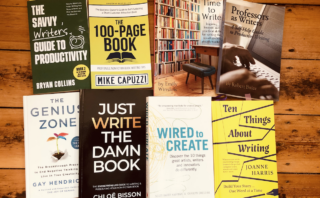Photo by Paige Cody on Unsplash
“In order to get that feeling of flow, a writer needs to get in the zone and stay in the zone.” — Tracy Chevalier, in Swallowed by a Whale: How to Survive the Writing Life
The ‘zone’ means that you write with 100% concentration. You are on peak performance. Hours might go by and you haven’t even noticed. You’re fully immersed in your topic and work with maximum focus. Writing becomes effortless. How often do you feel like that?
If you’re like me, daily writing often feels like the opposite.
You get up in the morning, read your emails, check social media — and it’s almost lunch before you notice that you’ve wasted your time. If you’ve ever felt like that, try need to establish writing cues to tell your brain that it’s flow time.
Why writing cues work
Psychologist Wendy Wood at the University of Southern California shows that cues, or triggers, are the best way to support habits because they provide a habit-promoting context. “If you set up your world to be constant, recurring, and unwavering, then cues can be the jet fuel to make your new habits take off with stupendous speed,” Wood writes in her book Good Habits, Bad Habits.
By using the same cues your brain will filter out any obstacles and distractions because it’s trained to expect writing now.
Cues could be:
- alarm to start writing
- favourite snack
- your writer’s cardigan
- focus music (e.g. binaural beats)
- meditate before writing
- visualise that you’re writing in flow for 30 seconds
Create your own flow ritual with cues
Here are simple steps to find your best cues for writing.
- Step 1: Make a list of 5 things that get you into the flow easily (e.g. a clean desk).
- Step 2: Make a list of your top 5 distractions (e.g. email notifications).
- Step 3: Pick 3–5 things from that list, stick them together, and use this flow ritual for a week every time before you start writing.
I call this a flow ritual, and you find a template to use in my free 2023 planner. You can also write these on a post-it or create a phone background or laptop screensaver — keep them visible.
Here’s a tip that I use when I struggle with creating new habits:
Rewrite your cues into ‘After…. I will’ sentences as James Clear recommends in Atomic Habits. Here are my own writing cues as an example:
- Drink cue: After I make my coffee, I will sit at my desk and open my laptop.
- Breath cue: After I sit down at my desk, I take three breaths
- Micro goal cue: After I meditated, I will write down three micro-steps (e.g. open Scrivener, find the right paragraph, type one word)
And finally, after I have opened the document, I will take a sip of that hot steaming coffee and start typing the first word.
Design streaks to track your habits
“Without seeing progress, it’s all too easy to burn out and give up.“ — Dan Sullivan & Benjamin Hardy, The Gap and the Gain
There’s no use writing down new habits and then forgetting about them. I’ve done that, I admit, but there’s a better way: the “streak method”. It means you set yourself a challenge of 7, 21, 30 or 90 days and commit to using your new habit every day.
- Step 1: If you could build an ideal streak time of using your writing habit, what would that be? 7 days? 14 days? 90 days? Commit to something doable and simple, then mark the start and end-date in your calendar.
- Step 2: Create a streak template (you’ll find templates in my free 2023 planner) so that you have boxes to tick off each day, week, or month. Hang it above your desk and keep a log of how often you’ve used your habit.
Bonus tip: Find a buddy to join you
“Knowing that someone is watching can be a powerful motivator. You are less likely to procrastinate or give up.” — James Clear, Atomic Habits
Find one other person, or better a group, and start a little habit challenge with them. You can share the steps you took to find your writing cues and encourage them to set their own.
What works well is an email thread, messaging group, or using an app such as habitshare which lets you set up and share your habits with others.
It’s so much easier to stick to new habits when you have someone holding you accountable.
***





